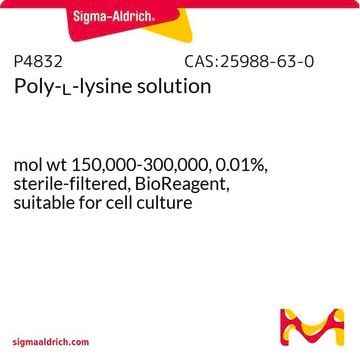추천 제품
product name
Poly-D-Lysine solution, 1.0 mg/mL, The Poly-D-Lysine solution promotes the adhesion of tissues/sections to the culture vessel.
Quality Level
형태
liquid
제조업체/상표
Specialty Media
기술
cell culture | mammalian: suitable
입력
sample type neural stem cell(s)
sample type epithelial cells
sample type: human embryonic stem cell(s)
sample type hematopoietic stem cell(s)
sample type mesenchymal stem cell(s)
sample type pancreatic stem cell(s)
sample type induced pluripotent stem cell(s)
관련 카테고리
일반 설명
Poly - D Lysine (PDL), a chiral form of alpha polylysine is a synthetically produced cationic polypeptide. It is a non-specific cell adhesion molecule (CAM). PDL is used extensively as a coating material in in vitro and ex vivo experiments.
애플리케이션
Poly-D-Lysine has been used:
- To coat culture vessels and provide a suitable surface for the growth and attachment of neuronal cells.
- In preparing the surface of coverslips for facilitating the attachment of non-adherent cells.
생화학적/생리학적 작용
Poly-D Lysine, (PDL) being cationic, facilitates the interaction with anionic sites on the tissues/cells promoting effective attachment to the growing surface. Positively charged PDL interacts with negatively charged cell membranes and promotes neurite outgrowth. Covalently bound PDL layers promote long-term culture of neuronal cells.
특징 및 장점
- Poly-D-Lysine (PDL) solution is diluted in phosphate buffer saline (PBS), water, or 0.1M borate buffer.
- Working dilutions of 50μg/mL to 100μg/mL are usually adequate.
- It has a surface coverage of 3-10μg/cm2.
- PDL can be stored at -20 ˚C for up to 18 months.
- Plates are coated for 3 hours overnight and up to 3 days when stored at 4˚C.
- PDL-coated plates are used immediately or stored in PBS for up to 5 days.
물리적 형태
Liquid. 20ml in sterile water.
제조 메모
The level of coating will vary for different species and types of cells. In general final coating concentrations from 3-10μg/cm2 of surface area will typically supply sufficient coatings for most cell types. Surface area of plates: (pi)(Radius squared) in cm2 In practical terms working dilutions of 50μg/mL to 100μg/mL are usually adequate. Dilute poly-D-lysine in PBS, water, or 0.1M borate buffer {prepared by adding 1.24 g boric acid and 1.9 g sodium tetraborate in 400 ml water, pH 8.5} to final working concentration. Plates or flasks are coated for 3 hours to overnight, and up to 3 days if stored at 4C. The best results are usually with just overnight coatings. Remove the poly-d-lysine solution and rinse with sterile PBS or water 1-2X. Do not scrape the bottom of the coated plates or flasks. Use plates immediately or store them with PBS for up to 5 days. Poly-D-lysine coating methods will vary slightly from laboratory to laboratory, please use the method as a general guide.
저장 및 안정성
Store at -20C for upto 18 months.
Storage Class Code
12 - Non Combustible Liquids
WGK
nwg
Flash Point (°F)
Not applicable
Flash Point (°C)
Not applicable
시험 성적서(COA)
제품의 로트/배치 번호를 입력하여 시험 성적서(COA)을 검색하십시오. 로트 및 배치 번호는 제품 라벨에 있는 ‘로트’ 또는 ‘배치’라는 용어 뒤에서 찾을 수 있습니다.
이미 열람한 고객
Enhancement of neuronal cell adhesion by covalent binding of poly-D-lysine
Hee Kim Y, et al.
Journal of Neuroscience Methods, 202(1), 38-44 (2011)
Evaluation and Optimization of Poly-d-Lysine as a Non-Natural Cationic Polypeptide for Gene Transfer in Neuroblastoma Cells
Sanchez-Martos M, et al.
Nanomaterials (Basel, Switzerland), 11(7), 1756-1756 (2021)
LGALS3 (galectin 3) mediates an unconventional secretion of SNCA/?-synuclein in response to lysosomal membrane damage by the autophagic-lysosomal pathway in human midbrain dopamine neurons
Burbidge K, et al.
Autophagy, 18(5), 1020-1048 (2022)
Detection of G-Quadruplex DNA Structures in Macrophages
Kastl M, et al.
Methods in Molecular Biology, 2713, 453-462 (2024)
Characterization of Seeding Conditions for Studies on Differentiation Patterns of Subventricular Zone Derived Neurospheres
Sanchez-Mendoza EH, et al.
Frontiers in Cellular Neuroscience (2016)
자사의 과학자팀은 생명 과학, 재료 과학, 화학 합성, 크로마토그래피, 분석 및 기타 많은 영역을 포함한 모든 과학 분야에 경험이 있습니다..
고객지원팀으로 연락바랍니다.






